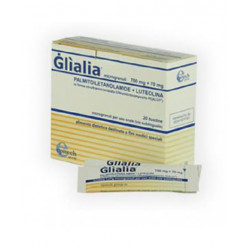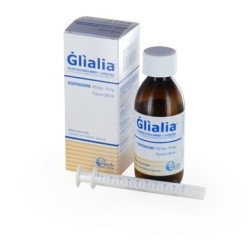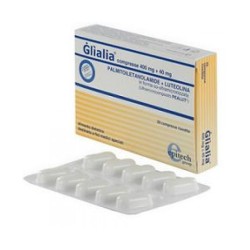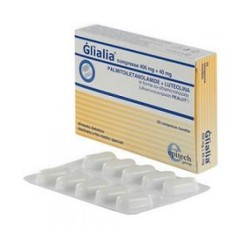Epitech Glialia 700mg+70mg 20 Bustine di Palmitoiletanolamide
€ 38,50
calendar_month 06/06/2024 - di Boscia Club - Pubblicato in Rimedi naturali
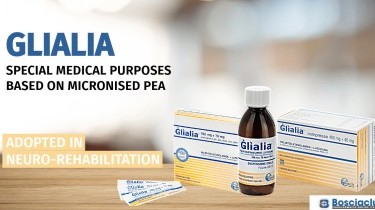
Glialia contains palmitoylethanolamide (PEA) and luteolin, two molecules with anti-inflammatory and neuroprotective properties.
Micronized PEA, or ultramicronized palmitoylethanolamide, is a form of PEA that has been milled into very fine particles. This makes it more easily absorbed by the body. PEA is a fatty acid amide that is found naturally in the body for his anti-inflammatory and analgesic effects. It is found in many foods, including peanuts, soy, and eggs.
Micronized PEA is available as a dietary supplement and is taken orally. It is typically used to treat chronic pain conditions, such as arthritis, neuropathic pain, and back pain. It may also be helpful for reducing inflammation and improving mood.
Numerous scientific studies, conducted both in vitro and in vivo, have supported the effectiveness of PEA in a wide range of applications. Its benefits have been demonstrated in various fields of medicine, including:
The study "Effects of PEA-LUT on Frontal Lobe Functions and GABAergic Transmission in Long-Covid Patients (PL-PC19)" explores the efficacy of PEA-LUT in patients suffering from neurological symptoms of Long-Covid showing improvements in several neurological symptoms like pain, anxiety, depression, brain fog, and anosmia.
The study "Palmitoylethanolamide Associated With Luteolin in Frontotemporal Dementia Patients. A Randomized Controlled Trial (PEA-FTD)" evaluated the efficacy of a dietary supplement containing palmitoylethanolamide (PEA) and luteolin in the treatment of frontotemporal dementia (FTD). The researchers observed that patients treated with PEA-luteolin showed improvements in some cognitive functions compared to the control group. In particular, there was an improvement in the ability to perform daily activities, memory, and language.
The mechanism of action of PEA was baptized ALIA (Autacoid Local Injury Antagonism) by Professor Rita Levi Montalcini, its discoverer. ALIA is based on PEA's ability to modulate the production of autocoids, substances produced locally by tissues in response to trauma or aggression.
Activation of the ALIA system by PEA leads to:
Glialia is used to treat a variety of conditions associated with neuroinflammation, including:
Glialia works by reducing inflammation in the nervous system. It does this by:
In addition to reducing inflammation, Glialia has a number of other potential benefits, including:
The recommended dosage is 400 mg of PEA and 40 mg of luteolin per day. Glialia can be taken with or without food.
Glialia may be a good option for people who are looking for a natural way to reduce inflammation and improve their nervous system health. However, it is important to talk to your doctor before taking Glialia, especially if you are pregnant, breastfeeding, or have any underlying health conditions.
Glialia is generally well-tolerated. However, some people may experience side effects such as nausea, vomiting, diarrhea, and headache. If you experience any side effects, stop taking Glialia and talk to your doctor.
Glialia sachets: These sachets contain a powder form of Glialia that can be mixed with water or juice. This format is ideal for people who prefer to take their supplements in a liquid form.
Glialia oral suspension: This oral suspension is a pre-mixed liquid form of Glialia that is easy to take. It is a good option for people who have difficulty swallowing tablets or capsules.
Glialia 400mg tablets: These tablets contain 400mg of PEA, the main active ingredient in Glialia. This format is a good option for people who want a precise dose of PEA.
The best format of Glialia for you will depend on your individual needs and preferences. If you are unsure which format is right for you, talk to your doctor or pharmacist.
Please note that Glialia is a supplement for special medical purposes and not a drug.
Bosciaclub online pharmacy is authorized by the Ministry of Health.
Our online pharmacists are available to provide information about micronized PEA.
Categorie del blog
Ultimi articoli





check_circle
check_circle
check_circle
check_circle

